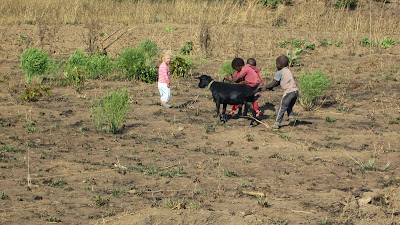Iwe – pronounced ee-way – means “you” in Bemba. It’s the
informal “you,” lacking an “m” and therefore lacking respect in the Bemba
language. Most children (and some ornery adults) get called “iwe” by their elders.
“Iwe, bring me the
pot.” “Iwe, stop making noise!” “Iwe, what are you doing?” These are the
things that moms say all day every day. (Kids names do get thrown in there too,
sometimes. “Iwe, Winnie, what’s the
problem?”)
More than just a word, iwe
signifies a position in life, a specific (low) spot on the social ladder and
sometimes just a goofy use of informality when the speaker is trying to make a
point.
I used to find the use of iwe to be not very nice and (pre-motherhood) swore that I would never call my child iwe. After all, she’s a human being,
worthy of dignity and respect – an image bearer of God! I can’t call my child
“you.” But, as I’ve become one with all
the mothers of all of the iwes,
my mind has changed on that point. Despite lacking any form of honor, iwe can also be a term of endearment,
acknowledging ones youth – similar to calling a small child baby even when they
are no longer a baby. Furthermore, as Bronwyn does more and more iwe-like things (including responding to
whoever calls her iwe) it just seems
fitting that she join the ranks of the little people who bear this title for
this season of her life.
As I scrolled through some recent pictures, I kept laughing
and calling to Jeremy, “Come look at her – she’s such an iwe!” And I’ve found her iwe-ness
so irresistibly sweet that I thought I’d share it here: a compilation of iwe things my kid does.
I realize that some of these things may not make any sense
to anyone who has not visited or lived in Zambia, and so if that’s you, just trust me that these things make Bronwyn the sweetest white iwe that ever was.
And so without further ado…
She assumes that everyone wants to hold her, play with her
etc. and is rarely put off by being picked up by a stranger.
 |
The bottoms of her feet are turning to leather, not to
mention her insistence on being half naked more than half of the time.
She knows to put her hands together and hold them up to
anything hot – including cooking fires, candles and (haha) the sun.
She thinks she’s a footballer and thinks she can play with
the big boys.
She “fetches water” like its her job, because
she has gathered that it is. (before you call cps, I do not ask my toddler to draw water. please know that
she can’t pick up one of those buckets when there’s water in it, and I
wouldn’t even let her try for like five more years. She is, however, obsessed with
going out to the well and tries to act all big-girl taking the empty buckets
out there.)
She also sweeps like it’s her job. Again, because she has gathered that
it is.
She screams at the top of her lungs at kids/bicyclists/goats
that are impossibly far away, just like everyone else.
She rolls all of her food like its nshima. Even if its rice
and beans, or spaghetti.
She has her own tribe of sure fire trouble makers.
She assumes all food is communal and insists on sharing.
She is training to be a professional goat wrangler.
She plays with dull knives and cuts things the exact way the Bamayos do it. That specific fist hold... its just so very iwe.
She eats amasuko, a kind of bush fruit.
She is studying the art of killing and plucking chickens.
She often grabs the closest chitenge and takes it to the nearest
woman as her way of saying “put me on your back and take me somewhere because
I’m bored here with mom.”
It's an action thing, so it's hard to capture, but she does the respectful curtsy when handing something over to someone.
She loves her make-shift, local, home-made toys.
She will do (almost) anything for a packet of ama jiggys. It might not get any more iwe than that.
Be still my heart, I have the most precious little iwe on the planet. The fact that she is
going to be crazy socially awkward whenever we go to America is not yet a
concern because these things are so darling to me I don’t want her to change. Her iwe-ness also is a big part of her normal-ness. For as long as possible, I want her to avoid the awkward of being "the white kid," and instead enjoy the carefree pleasures of being a run of the mill iwe.
Nalikutemwa iwe ka Winne, umwana wandi. I love you little Winnie, my child.

























So sweet. Thank-you for sharing little pieces of your life and culture.
ReplyDeleteLove the pictures.... love your beautiful Winnie... and love your ability to articulate and share with us your thoughts.... I'm so glad I visited Fimpulu and enjoy the things I recognize, even the word "/we" and how it's used.... how much more fun now to see it in the context of a loving mother using it with her child... May God bless you!!
ReplyDeleteThis is precious, thank you for sharing - it's neat to know and learn about your culture and what it's like for the little ones:)
ReplyDelete